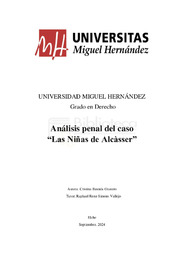Resumen :
El “caso de Alcàsser” o “de las niñas de Alcàsser” marcó un antes y un después en la historia y la sociedad de nuestro país, llegando a traspasar nuestras fronteras y colándose en las noticias destacadas a nivel internacional. Sin embargo, a pesar de haber cumplido actualmente su pena el único procesado como autor del triple crimen, el caso continúa vivo, tanto desde una visión puramente jurídica, tras el hallazgo en 2019 de unos huesos pertenecientes a una de las niñas1, como desde una visión social, en el recuerdo de cada uno de los ciudadanos españoles.
Sentado lo anterior, es pertinente explicar el objetivo de este trabajo, pues no es otro que el de tratar de aportar una visión actual, jurídicamente justificada, sobre el caso más mediático y brutal de la historia de nuestro país. El presente texto se encuentra desarrollado en tres partes, una primera parte que trata de explicar, principalmente, el contexto en el que se enmarcaba el caso; una segunda parte que efectúa la cronología de los hechos, fase de instrucción y ejecución del mismo, así como, por ende, ahondando en los delitos penales producidos, y finalmente, una visión actual del caso, profundizando en su inmediata influencia sobre nuestra sociedad, y como ello ha repercutido en nuestra visión jurídica, con la nuevas legislaciones sobre los delitos contra la libertad sexual.
Todo ello, con tal de facilitar la lectura y delimitar el contenido de una forma coherente y lineal que permita la compresión y el seguimiento del trabajo, a todo tipo de lectores, y no únicamente a aquellos que posean nociones en Derecho, sino a todo aquel que desee profundizar y aclarar, de una forma técnica el presente caso.
The ‘Alcàsser case’ or ‘the Alcàsser girls’ case’ marked a before and after in the history and society of our country, crossing our borders and making international headlines. However, despite the fact that the only person prosecuted for the triple crime has now served his sentence, the case is still alive, both from a purely legal point of view, after the discovery in 2019 of some bones belonging to one of the girls, and from a social point of view, in the memory of each and every Spanish citizen.
Having said this, it is appropriate to explain the objective of this work, as it is none other than to try to provide a current, legally justified view of the most mediatic and brutal case in the history of our country. The present text is developed in three parts, a first part that tries to explain, mainly, the context in which the case was framed; a second part that explains the chronology of the facts, the investigation phase and its execution, as well as, therefore, delving into the criminal offences produced, and finally, a current vision of the case, delving into its immediate influence on our society, and how this has had an impact on our legal vision, with the new legislation on crimes against sexual freedom.
All this, in order to facilitate the reading and delimit the content in a coherent and linear way that allows the understanding and monitoring of the work, to all types of readers, and not only to those who have notions in Law, but to all those who wish to deepen and clarify, in a technical way, the present case.
|
 La licencia se describe como: Atribución-NonComercial-NoDerivada 4.0 Internacional.
La licencia se describe como: Atribución-NonComercial-NoDerivada 4.0 Internacional.
.png)
